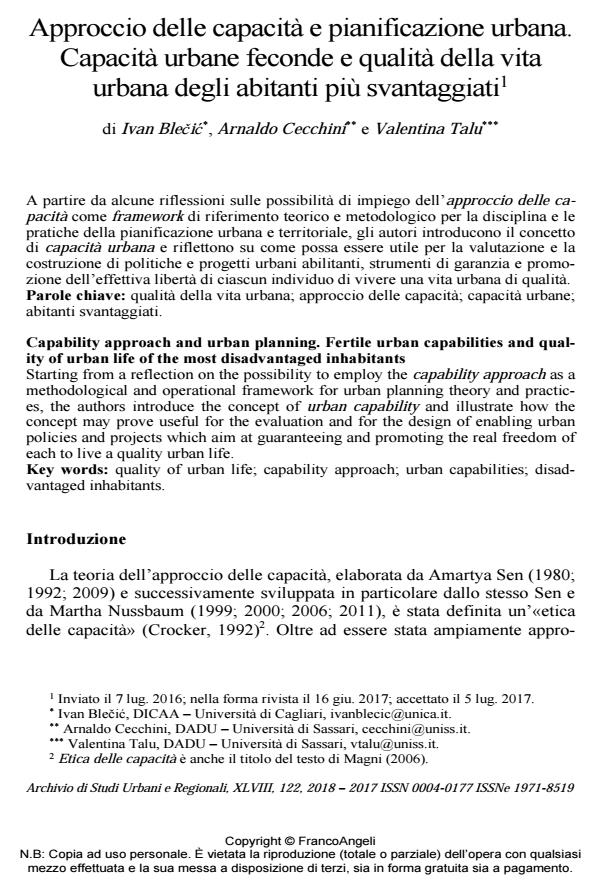Capability approach and urban planning. Fertile urban capabilities and qual-ity of urban life of the most disadvantaged inhabitants
Journal title ARCHIVIO DI STUDI URBANI E REGIONALI
Author/s Ivan Blecic, Arnaldo Cecchini, Valentina Talu
Publishing Year 2018 Issue 2018/122
Language Italian Pages 19 P. 34-52 File size 214 KB
DOI 10.3280/ASUR2018-122003
DOI is like a bar code for intellectual property: to have more infomation
click here
Below, you can see the article first page
If you want to buy this article in PDF format, you can do it, following the instructions to buy download credits

FrancoAngeli is member of Publishers International Linking Association, Inc (PILA), a not-for-profit association which run the CrossRef service enabling links to and from online scholarly content.
Starting from a reflection on the possibility to employ the capability approach as a methodological and operational framework for urban planning theory and practices, the authors introduce the concept of urban capability and illustrate how the concept may prove useful for the evaluation and for the design of enabling urban policies and projects which aim at guaranteeing and promoting the real freedom of each to live a quality urban life.
Keywords: Quality of urban life; capability approach; urban capabilities; disad-vantaged inhabitants.
- Capabilities, Learning, and Urban Quality of Life Arianna Luisa Cavaliere, pp.1 (ISBN:978-3-658-49430-8)
- Computational Science and Its Applications – ICCSA 2019 Ivan Blečić, Alessandra G. Santos, Ana Clara Moura, Giuseppe A. Trunfio, pp.612 (ISBN:978-3-030-24301-2)
- Capabilities, Learning, and Urban Quality of Life Arianna Luisa Cavaliere, pp.259 (ISBN:978-3-658-49430-8)
- Computational Science and Its Applications – ICCSA 2025 Workshops Ivan Blečić, Alessandro Floris, Giulia Giliberto, Giuseppe A. Trunfio, pp.341 (ISBN:978-3-031-97605-6)
- Mobility Policies and Extra-Small Projects for Improving Mobility of People with Autism Spectrum Disorder Arnaldo Cecchini, Tanja Congiu, Valentina Talu, Giulia Tola, in Sustainability /2018 pp.3256
DOI: 10.3390/su10093256 - Computational Science and Its Applications – ICCSA 2024 Workshops Becchio Cristina, Bottaccioli Lorenzo, Bottero Marta, Cavana Giulio, Fancello Giovanna, Sciullo Alessandro, pp.207 (ISBN:978-3-031-65307-0)
- Capabilities, Learning, and Urban Quality of Life Arianna Luisa Cavaliere, pp.95 (ISBN:978-3-658-49430-8)
- Capabilities, Learning, and Urban Quality of Life Arianna Luisa Cavaliere, pp.9 (ISBN:978-3-658-49430-8)
Ivan Blecic, Arnaldo Cecchini, Valentina Talu, Approccio delle capacità e pianificazione urbana. Capacità urbane feconde e qualità della vita urbana degli abitanti più svantaggiati in "ARCHIVIO DI STUDI URBANI E REGIONALI" 122/2018, pp 34-52, DOI: 10.3280/ASUR2018-122003